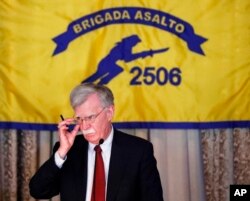VOA's Wayne Lee contributed to this report.
WHITE HOUSE — The Trump administration is imposing new restrictions on Cuba aimed at punishing the regime for its support of the Venezuelan President Nicolas Maduro.
U.S. National Security Adviser John Bolton on Wednesday announced new limits on the amount of money Cuban Americans can send to relatives on the island at $1,000 per person every three months.
In addition, the administration will impose new "regulatory changes to restrict non-family travel to Cuba," Bolton said in a speech in Miami to a Bay of Pigs veterans group on the 58th anniversary of the failed CIA-orchestrated invasion of the island in 1961.
The announcement followed one by Secretary of State Mike Pompeo that the administration will allow U.S. citizens to sue foreign businesses using property seized during the 1959 Cuban revolution. The policy shift means lawsuits can be filed beginning May 2.
The U.S. government has already certified nearly 6,000 claims valued at more than $8 billion, including actual value and interest.
The decision likely will hinder Cuba's efforts to encourage foreign investment to the Caribbean island. The move is part of Trump's broader campaign to crack down on socialist Latin American countries Cuba and Nicaragua, and to oust Maduro, whose grip on power depends largely on support from Cuba, along with Russia and China.
"For years now, the Cuban regime has suffocated Venezuela's independence and directly contributed to the current crisis for its own gain and survival," Bolton said. "At this moment, Havana continues to prop up Maduro and help him sustain the brutal suffering of the Venezuelan people."
"As President Trump has said, Maduro is quite simply a 'Cuban puppet,''' Bolton said.
The European Union has warned it will protect the interests of European companies or people conducting business in Cuba who may be affected by any lawsuits. Spain, which has large investments on the island, has asked the EU to challenge the U.S. decision, a senior government official said.
European countries have long expressed concern about lifting waivers on the law, Title III of the Helms-Burton Act, and threatened to challenge the move at the World Trade Organization. The act codified all U.S. sanctions against Cuba into law 23 years ago, but was waived by every U.S. president since then, due to opposition from the international community and the desire to avoid trade disputes and potential lawsuits.
"Allowing these lawsuits marks another own goal in President [Donald] Trump's Cuba policy," said James Williams, president of Engage Cuba, which lobbies for the normalization of U.S. ties with the communist island. "This doesn't punish the Cuban government; it lets them off the hook."
Williams told VOA that American and European companies, which had permission to do business with Cuba, will be the ones hurt by the action, and Washington should negotiate for direct compensation from the Cuban government for property confiscation.
"The extraterritorial application of the U.S. embargo is illegal, contrary to international law and I also consider it immoral," the EU ambassador to Cuba, Alberto Navarro, said in Havana.
WATCH: US Restricts Cuba Amid Crackdown on Maduro in Venezuela
A six-decade old economic embargo of Cuba by the United States remains in effect.
During the Obama administration, there were initiatives by Washington to calm the rough waters across the 150 kilometers (93 miles) separating Florida and Cuba, but the Trump administration has reverted to a Cold War-era approach toward Havana.
"It is ironic that President Trump would make this fringe decision after the Trump Organization worked for years to open a Trump Hotel and golf course in Cuba," Williams told VOA. "We have 60 years of history that shows we need to try something new. The Cuban and American people deserve better."









